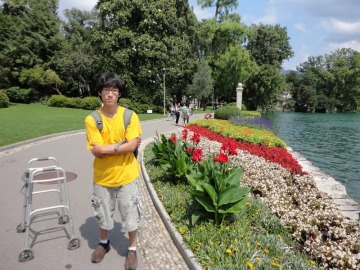Many UArizona students with disabilities have studied abroad and you can learn about some of their experiences:
"[Studying abroad] is one of the best things I have ever done. I gained lifelong friendships, amazing memories, and it reinforced my independence. I had always felt that I was pretty independent but when you travel abroad alone you really get to see how true that is as you navigate a new country on your own and learn new things. I learned a lot about myself during my study abroad experience. I gained a clearer understanding of what is important to me, what I enjoy, and who I want to be as a person.
Advice to students considering going abroad:
- Do research and plan. You need to look into the programs available and you need to find out what is the accessibility available at the host institution. Be really clear with the accommodations you need. For example, I wanted to make sure the bathroom at the residence hall was going to meet my accessibility needs so I had the institution send me pictures of the room I was going to be staying in. You need to be prepared to be open and honest about the accommodations/assistance you will need at many points of the planning stage and actual trip. Not all places are required to provide the same kind of accessibility as the U.S. which is why you need to ask ahead of time. And since you need to do research and plan you need to give yourself enough time. I recommend to begin looking into programs at least a year prior.
- Research airlines and find the one you’ll be most comfortable flying with. If you have never flown before, ask around and get advice from others with disabilities how they manage when flying. Things from getting around the airport to once on the plane and using the restroom. These are things you need to be aware of so you can mentally prepare yourself for it.
- Think about possible "what-if" scenarios and how you will handle them if they happen. For example, I use a power wheelchair to get around. I thought ahead of time "What if it breaks down when I am abroad? What will I do?" which prompted me to look into wheelchair repair shops in the city I was studying abroad and contacting them ahead of time if they would be able to help if needed. I am glad I did because my batteries ended up blowing a fuse the first day in Australia. But because I had planned ahead and thought "what-if" I was prepared.
Go into the study abroad experience with an open mind.
“[Studying Abroad] will change you!” I met a lot of different people, and I’ve become more accepting of how the world really is. Not every country is a diverse as the US is so you get a sense of that. I was determined to make it work and I found “workarounds” for access.”
Erik's advice to students considering going abroad:
“Do it”…if you can! “If you have doubts that are not serious you should explore it. I didn’t know anything about Study Abroad and but I knew it was something I really wanted to do and I am really glad I did it.”

"If, like me, you thought your disability might be a roadblock to having an incredible study abroad experience, THINK AGAIN! As a disabled student, the University of Arizona’s DRC office was instrumental in helping me successfully complete a semester abroad with the Arizona in Italy program. Through advanced planning, my disability accommodations were still available to me despite being over 6,000 miles and 8 time zones away from our Tucson campus. Before traveling overseas, my DRC Access Consultant and my Study Abroad Coordinator worked together in setting up my accommodations with my professors in Italy. This partnership between both offices helped to assure my academic success while I delved into my Italian studies.
Additionally, I was a fortunate recipient of the highly coveted Benjamin A. Gilman International Scholarship which promotes study abroad for qualified students. This scholarship offers grants of up to $5,000 for many types of undergraduate US citizens…drum roll please…including students with disabilities! As the Gilman Scholarship website states,
The Gilman Scholarship Program aims to support students who have been traditionally under-represented in education abroad, including but not limited to, students with high financial need, community college students, students in underrepresented fields such as the sciences and engineering, students with diverse ethnic backgrounds, and students with disabilities.
The Gilman Scholarship is sponsored by the US Department of State Bureau of Educational Affairs, and you can find more information by visiting their website. DRC students are extremely fortunate because our Study Abroad Office offers free workshops custom-designed to assist students in applying for the Gilman Scholarship. Furthermore, UA’s Study Abroad Office offers additional travel grants based on merit and/or financial need; I was blessed to be a recipient of one of these.
The DRC, Study Abroad Office and Gilman Scholarship all worked together in affording me a once-in-a-lifetime opportunity for a semester chock-full of cultural exploration, education and exchange. If you’re registered with the DRC and have a little bit of wanderlust in your heart, I hope you take advantage of these and other resources to make your study abroad dreams come true!"


